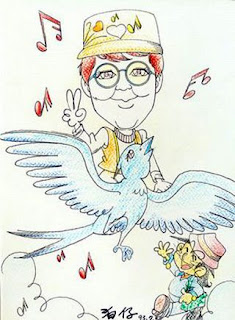Yenlin Ku, summary of a talk at a
conference on the 200th anniversary of the
birth of Joseph Smith, 2005
First of all, I’d like to make a brief self-introduction. Before joining
the civil service, I was a professor of women studies at National Chiao Tung
University, and director of the Awakening Foundation, the first and for many years
the only feminist organization in Taiwan. I belong to no religious or political
groups. Feminism has been the anchorage of my values and directed my personal
as well as professional growth. For a long time, Mormons meant to me two
clean-cut young Caucasian men riding their bikes around, trying to convert
people to their belief. I have to confess here that when they came to knock on
my door, I always said, “Sorry, I’m busy.” (Actually, I was really busy.)
I came into closer contact with the Mormons when I headed the Department
of Social Services in Taipei and afterwards. What impressed me the most was
that these people were really serious about doing good things, not just put on
a show like most politicians do. And they always seemed warm-hearted, contended
and self-disciplined. These qualities looked like an amazing combination to an
outsider like me. And I’m very thankful that they were always so kind as to put
up with my sometimes radical ideas and behaviors.
Feminism
taught me to set up the goal to change the people and the world that are
dominated by patriarchal ideology and practice. If the division of labor is
drawn along the gender line, then people of either sex would be deprived of some
crucial life experience, and prevented from developing their full potentials. When
all social institutions are dominated by one sex with partial life experience,
some important aspects of human needs would inevitably be neglected. For
instance, when women are assigned the role of caring for the old, the young,
the disabled and the family, men would lose out on such human experience. As major
decision makers and policy makers in society, they would be unable to respond
to such basic human needs. It is no wonder that many of our social policies and
programs are not pragmatic and/or wasteful. We need to educate men in the
traditional women’s role of caring, and give women more opportunities of social
participation and decision making, and to develop for both men and women a
gender balanced view of the world.
Through my limited contact with the Mormon Church, I found both the
teachings of Joseph Smith and feminism are seeking a better world for humankind,
in which there is more sharing, caring, mutual respect and love and less
violence. I believe the Mormons have developed some good methods in educating
their youngsters and managing their family lives. My colleagues in Taipei City
Government and I had the opportunity to observe a demonstration of family
night. We were deeply touched by the intimate interaction of family members,
and the spirit of democracy practiced in role ex-change. I believe this weekly practice
would provide a solid base for building a loving and sharing community. So we
are going to introduce it to our city residents through community colleges and
district offices. And in the meantime, I wonder if the concept of family can be
extended a little further beyond the blood relatives. In an age when population
structure and life style are changing so rapidly, we are having lower
birthrate, growing number of old people, and different sexual orientations. Can
we accept a broader definition of family to include foster families,
collective-living families, gay families, and so on? We are in great need of
foster families in this city to look after battered children and abandoned
children, some of whom are severely handicapped. We also need support for
single parent households, the disabled and the elderly. If the traditional
families provide a vertical support system in which the older generation and
younger generation support each other, is it time to consider a horizontal
support system in which people of the same generation support each other within
or across the family line?
In addition to the research questions put forward by Dr. Walters, I’d
like to put in front of you a very basic question, if Joseph Smith lived today,
would he agree to the transgression of gender line and family line? Or gender
and family could be redefined in today’s world?








沒有留言:
張貼留言